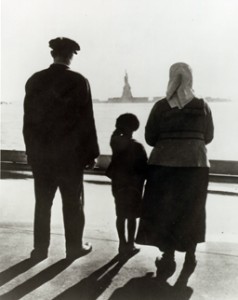Guest Post
 Here's a story you can tell the next time someone says America needs immigration reform. It's the story of Norma Uy from the Philippines. Back in the '80s, millions of men, women, and children from around the world illegally entered the U.S. But Uy didn't want to go that route.
Here's a story you can tell the next time someone says America needs immigration reform. It's the story of Norma Uy from the Philippines. Back in the '80s, millions of men, women, and children from around the world illegally entered the U.S. But Uy didn't want to go that route.
So 33 years ago, Uy got in line. That is, she started the legal process to enter the United States.
It took a long time, but she didn't want to carry the stigma of an illegal alien in America, even though President Reagan could have granted her amnesty if she had left in the early '80s.
Uy was patient.
Uy was resilient.
And eventually, Uy earned her spot in America.
Because in 2002, 21 years after she started the legal process to get into the United States, Uy finally got her ticket. Her visa to legally enter the United States.
These are the people you want to enter the U.S., right? People who follow American laws before they even enter the country. People who don't think they can earn their place by crossing into the U.S. under the cover of darkness.
Uy was the type of immigrant you want.
But there was a problem. And this type of problem is the root of the immigration situation in America.
When Uy applied in 1981, she had a 2-year-old daughter. A provision in the law allowed parents to extend their visa to their children. Twenty-one years later, however, her baby girl was a full-grown adult. And under current U.S. immigration laws, adults can't obtain a visa through their parents.
In other words, Uy's daughter had to get back in line. The same line that took her mother 21 years to get through.
So Uy faced a problem, one that many people who want to follow the law have to deal with. Should Uy leave her child in the Philippines and move to America? Or should she stay behind with her family and give up her chance at a better life?
This is the real issue behind the current immigration problem. The laws the U.S. has to control the borders and permit people to enter are so complex, and the wait so long, it's keeping out the type of people we should want to let in. Uy, or people like her, could have illegally found their way into the U.S., laid low for a few years, and gotten amnesty.
Now she's stuck in a no-win situation.
Here's something else to consider. The U.S. has had a rough time the past six years. Two presidents trying to meddle, control, and rein in the economy caused the problems of today. People are dropping out of the labour force, and any economic "growth" you hear about in the news is really Fed money manipulations (when that bubble pops, things are going to get real bad).
But even with all this, the country still has a problem with people wanting to live there. You don't see any headlines about Colombia building a wall on their border to stop immigrants from Central America. No one wants to go there. They want to go to the U.S..
People vote with their feet. And the U.S. should be proud that people are willing to leave the country where they were born and raised for a shot at something better. This has been an American theme since the discovery of the New World.
Now, before you start commenting to voice your complaint, I should clarify something. I don't think the borders should be open to everyone. We just need to make it as easy as possible for people like Uy and other law-abiding citizens to get in as soon as possible.
There are people you need to keep out. They'll be the ones trying to illegally enter the country if we make the immigration process simple, easy, and efficient. Everyone else will be hopping in line with the Norma Uys of the world, waiting a couple of months before collecting their visa and starting their new life in America.
But as long as immigration remains a political problem, that won't happen.
This post first appeared at the Laissez Faire Books blog.
RELATED:
- Myths and Facts about a Rights-Respecting Immigration Policy – Ari Armstrong, OBJECTIVE STANDARD
- America's Drug War is Indeed Responsible for the Unaccompanied Minor Crisis – Shikha Dalmia, REASON
- Immigration plus Welfare State equals Police State - George Reisman, GEORGE REISMAN’S BLOG
- Fighting terrorism requires legalizing immigration - James Valliant, ARIZONA WATCH
- Immigration Quotas vs. Individual Rights: The Moral and Practical Case for Open Immigration – Harry Binswanger, CAPITALISM MAGAZINE
No comments:
Post a Comment